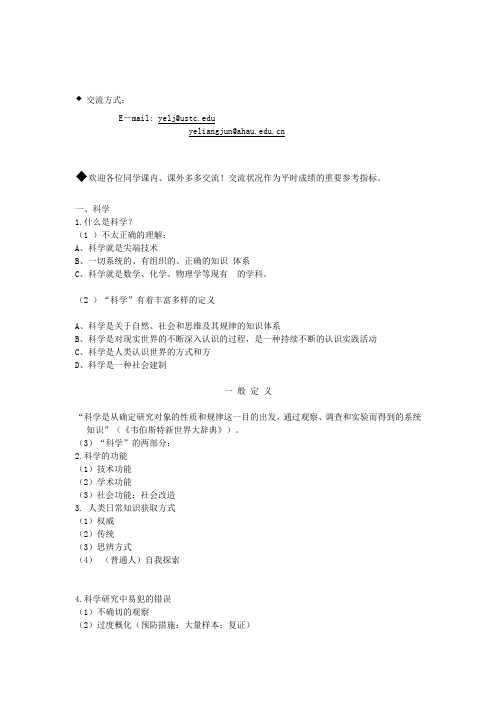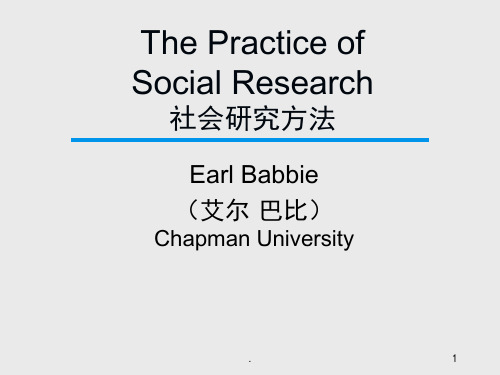《社会研究方法》(课堂PPT)
社会研究方法社会调查研究方法.ppt

量化研究与质性研究的比较
定量研究
定性研究
哲学基础 研究范式 理论模式 主要目标 分析方法 主要方式
资料收集技术
研究特征
实证主义 科学范式
理论检
确定相关关系和因果联系
统计分析 实验、调查
量表、问卷、结构观察等
客观
人文主义 自然范式 理论建构 深入理解社会现象 文字描述 实地研究 参与观察、深度访问
主观
主要包括:调查研究法、实地研究法、实验 法、文献法等,其中调查研究法和实地研 究法是社会研究方法中最主要的方法。
3. 社会研究的对象
社会研究是一种以经验的方式,对社会
中人们的行为、态度、关系,以及由
此所形成的各种社会现象、社会产物所进 行的科学探索活动。
4. 社会研究的根本目的
是形成和产生有关社会世界的系 统知识,增加人类对自身以及生存 的社会的理解。
主要类型主要类型调查研究实验研究实地研究文献研究社会研究的基本方式子类型资料收集方法研究方式资料分析方法研究的性质调查研究普遍调查抽样统计报表自填式问卷结构式访问统计分析定量实验研究实地实验实验室实验自填式问卷结构式访问结构式观察量表测量统计分析定量实地研究参与观察个案研究无结构观察自由式访问定量分析定性文献研究统计资料分析二次分析内容分析历史比较分析官方统计观察他人原始数据文字声像历史文献统计分析定性分析定量定性3
现代理解:
社会是一个复杂的系统,它是以人和人群共
同体为活动主体、以生产方式为经济基础的多 种要素、各种结构按照一定方式结合成的有机 整体。
2、社会活动与社会现象的基本特点
(1)主观目的性 (2)极大的偶然性 (3)错综复杂性 (4)易变性(流动) (5)高度模糊性
“奴隶” 是怎样炼成的?
社会研究方法_全套_ppt课件

三 《社会研究方法》 (上下) [美]艾尔.巴比 华夏出版社 、 《社会研究方法》 袁方 北京大学出版社
参 《现代社会研究方法》 吴增基 上海人民出版社
考 《社会研究研究方法》 宋林飞 辽宁人民出版社
资 料
《现代社会研究方法》 风笑天. 南京大学出版社 《社会研究方法通用教程》 邹农俭 中国审计出版社 《社会的质性研究与量性研究》 陈向明 北京大学出版社
精品课件
中层: 研究方式
调பைடு நூலகம்研究 实验研究 实地研究 文献研究
精品课件
低层: 研究技术
•查找文献的技术 •抽样技术 •设计问卷的技术 •访问技术 •观察技术 •实验技术 •统计技术 •整理和审核资料的技术 •使用照相、录音和计算机的技术等
精品课件
五、社会研究方法的研究过程
认识------选择课题-----文献检索----探索性 研究---
精品课件
3. 社会研究是在一定的理论指导下,运用具体的 方法,了解社会事实的发生和发展,弄清社会现象的变化, 揭示社会要素之间的内在联系,从而达到正确认识和解释社 会现象,有利于把握社会现象变化的目的。
精品课件
第一章 社会研究的概念与特征
精品课件
一、社会研究的对象
社会事实 社会结构 社会行动
精品课件
在教学中,结合现实,理论联系实践,设计一次完 整的课外研究研究活动,作为考查学生课堂所学的参 考。
最后综合三项考试得分和研究效果计算出本课程的 总评成绩。
精品课件
1.课堂参与,包括课堂提问回答、课堂讨论、课 堂作业,占20%
2.课后练习,包括查找资料,课后作业,课外研 究,期中考试,占30%。
3.期终考试,占50%。
社会研究方法社会调查研究方法.ppt

哲学基础
方法论
逻辑、范式
社
价值
会
客观性
学 研 究 方
基本方法
调查研究 实验研究 文献研究
社会测量技术 资料收集技术 资料整理和分析 技术;
法 体
实地研究 计算机应用技术
观察记录表、
系
量表、
专门技术与工具
测验表 问卷或调查表、
辅助器材
二、社会研究方法的主要特征
1.数学方法对社会研究的影响 2.自然科学研究方法对社会研究方
社会研究方法
(社会调查研究方法)
对外经济贸易大学思政部
乐平
第一章 社会研究方法概述
教学目的与要求:
从整体把握社会学研究的特征、意义和方 法体系;了解定量研究和定性研究;研究的 主要阶段。有助于理解社会学以及相关的社 会科学的基本内容。
第一节 社会研究的概念和特征
一、社会与社会现象的特点
1、什么是社会?
案例
研究中的价值中立问题
? 价值中立:是指科学家在研究自己的对象时,
应当遵循客观事实,而撇开自己的政治主张与立 场,回避自己的价值。 (社会科学的规范性原则 )
? 价值关联:社会科学依据一定的价值与一定的
实在发生联系。由于社会科学的研究对象本身受 特定的价值观和文化取向的支配,研究要与对象 的文化 意义相联系。(社会科学的构成性原则 )
现代理解:
社会是一个复杂的系统,它是以人和人群共
同体为活动主体、以生产方式为经济基础的多 种要素、各种结构按照一定方式结合成的有机 整体。
2、社会活动与社会现象的基本特点
(1)主观目的性 (2)极大的偶然性 (3)错综复杂性 (4)易变性(流动) (5)高度模糊性
《社会学研究方法》PPT课件

第二讲
测量、问卷设计和抽样
主要内容: 1、测量及其信度和效度; 2、问卷设计; 3、抽样及其方法。
一、测量
测量就是根据一定的法则,将某种事物或现 象所具有的属性或特征用数字或符号表示出 来的过程。
作用:在于确定一个特定分析单位的特定 属性的类别或水平,
1、概念化
宗教虔诚 偏见 同情心 (每周去教堂的次数) (不雇佣女性做主管) (给东南亚海啸捐款)
构造效度 其他概念的准确程度
5、概念的操作化
操作化
将抽象的概念转化为可观察的具体指标的过程。
概 念
概念化
操作化
指标
操作化的方法
澄清与界定概念 概念定义的范围 决定一个定义
发展测量指标
列出概念的维度 建立测量指标
指标选择的多样性
度假
职业
住房
保险
夫妻权力
医疗
子女 食品
义工
二、问卷设计
1、问卷的概念及其结构
1、调查研究
普遍调查 抽样调查
统计分析
定量
2、实验研究
实地实验 实验室实验
统计分析
定量
3、实地研究
参与观察 个案研究 统计资料分析 二次分析 内容分析 历史比较分析
定性分析 统计分析
定性
4、文献研究
定量/定性 定性分析
3、社会研究的过程
选择研究问题 研究设计 调查法
实验法
文献法
实地法
定量分析
定性分析
应用层
中间层
基础层
整群抽样
从总体中随机抽取一些小的群体,然后 由抽出的若干个小群体内所有元素构成 的样本。
上海二手房区域价格
多段抽样
按抽样元素的隶属关系或层次关系,把 抽样过程分为几个阶段进行。
社会研究方法课件ppt

研究对象是指研究关注的群体 或个体。选择研究对象时需要 考虑其代表性、可获取性和可 操作性。
样本量的确定
样本量的大小取决于研究目的 、研究问题和资源限制等因素 。通常,样本量越大,研究结 果越具有代表性和可靠性。
抽样方法的选择
抽样方法包括随机抽样、分层 抽样、整群抽样等。选择合适 的抽样方法可以提高研究的效 率和效果。
研究是否以较低的成本获得较为满意的结果。
研究方法的改进与完善
研究设计
优化研究设计,提高研究的内部效度和外部效度 。
数据采集
采用更为科学的数据采集方法,提高数据的准确 性和可靠性。
样本选择
改进样本选择方法,提高样本的代表性和可靠性 。
数据分析
采用更为先进的数据分析方法,提高数据分析的 准确性和可靠性。
03
定量研究方法
描述性统计
01
统计表
描述性统计是通过创建统计表来展示数据的分布情况、集中趋势、离散
程度等特征。
02
图形展示
通过绘制直方图、箱线图、散点图等图形,更直观地展示数据的分布特
征和规律。
03
集中趋势和离散程度
描述性统计还涉及计算数据的集中趋势指标(如平均数、中位数)和离
散程度指标(如标准差、方差、四分位数间距),以全面描述数据的分
定量研究方法
定性研究方法
定量研究是一种使用数学和统计工具 来描述、解释和预测社会现象的研究 方法。它强调对数据的量化处理和分 析,通常采用问卷调查、实验等手段 进行研究。
定性研究是一种注重对研究对象进行 深入、细致的描述和分析的研究方法 。它通常采用参与观察、深度访谈、 案例分析等方法进行研究。
混合研究方法
社会研究方法课件

♦交流方式:E-mail: yelj@yeliangjun@◆欢迎各位同学课内、课外多多交流!交流状况作为平时成绩的重要参考指标。
一、科学1.什么是科学?(1 )不太正确的理解:A、科学就是尖端技术B、一切系统的、有组织的、正确的知识体系C、科学就是数学、化学、物理学等现有的学科。
(2 )“科学”有着丰富多样的定义A、科学是关于自然、社会和思维及其规律的知识体系B、科学是对现实世界的不断深入认识的过程,是一种持续不断的认识实践活动C、科学是人类认识世界的方式和方D、科学是一种社会建制一般定义“科学是从确定研究对象的性质和规律这一目的出发,通过观察、调查和实验而得到的系统知识”(《韦伯斯特新世界大辞典》)。
(3)“科学”的两部分:2.科学的功能(1)技术功能(2)学术功能(3)社会功能:社会改造3. 人类日常知识获取方式(1)权威(2)传统(3)思辨方式(4)(普通人)自我探索4.科学研究中易犯的错误(1)不确切的观察(2)过度概化(预防措施:大量样本;复证)(3)选择性观察(4)非逻辑推理(赌徒谬误)5.现代科学的求知方式(1)提出假设(演绎)(2)操作化(3)经验观察(4)得出结论(归纳方法)存在的缺陷:(1)缺乏创新(2)操作化难度大(3)科学知识的相对真理性6.当代科学发展的特点与局限性(1)当代科学发展的特点:A、深度分化:更加专门化、精细化、微观化的方向发展B、高度综合:具体学科间在对象、规范和方法等方面相互交叉、渗透、借鉴、移植,产生许多交叉学科、边缘学科、横断学科等(2)当代科学发展面临的问题:A、科学与文化的分离B、科学方法的局限性C、社会制度的制约二、社会科学1.社会科学与人文科学(3)研究方法的区别◆社会科学,重视实证研究、因果说明,有时还作相当程度的实验性和定量化研究;◆人文科学,需要对具有个体性、独特性的现象进行体验、思考,需要个性化的感受、理解和表达,并不追求与他人的认同。
《社会研究方法》(课堂PPT)

.
14
A Book 一本书
▪ All of these are the same book, but it looks different
when viewed from different locations, perspectives, or “points of view.” 这些都是同一本书。但放置的位置、视 角不同或人们观点不同,他看起来就不一样。
▪ Data collection - observation 资料搜集旨在整理观察的 结果
.
9
Answer: D
▪ Individuals learn all they need to know from personal experience, discovery and from what others tell us.
▪ 个体通过个人体验、主动探究发现和别人 告知的,来获取所需的知识
部分来自于别人告知的约定俗成的知识。
▪ This agreement reality both assists and hinders our attempts to find out for ourselves.这
些约定俗成的真实,既可能帮助也可能阻碍我们亲手去发掘真实。
.
6
Sources of Secondhand Knowledge
Question
▪ In your discussion of measurement with a friend, she argues that what you are trying to measure does not exist and your own point of view will determine what you perceive in measuring. She has which view of reality?
社会研究方法 全套PPT

公式表示: P1(问题) TT(试验性理论)
EE(排除错误)
P2(新问题) ……
2020/7/9
库恩(T.Kuhn)的“范式”概念
其代表作《科学革命的结构》(1962)
范式是指研究、观察问题时的角度、视野和参照框架 。
科学发展动态模式为:前科学时期
常规科学
时期
反常和危机
科学革命
新的
常规科学时期……
2020/7/9
2. 社会研究方法是一种科学的研究社会的方法,它 的特殊价值就在于提供探究事物的合乎逻辑和有利于观察的 方法,帮助我们超越个人的偏见、超越个人的眼界来看世界。 通常我们不断地希望逃避现实的社会问题,而转向和自身 利益有关的事物。社会科学研究提供了一个机会,让我们面 对问题,并且体验如何改变世界。
(2)作用:广泛、一般状况 客观、精确地解释社会现象 较精确地研究人们的意见、态度
(3)局限性:不深入,信息不详细 无法了解具体的社会生活环境或行为过程 资料的准确性受到影响
2020/7/9
4、定性研究
(1)特点:只研究少数个案 深入、细致研究 无结构、非标准化、资料无法汇总统计 主观分析
(2)适用范围:解剖一两个有代表性的社会单位 了解社会现象发展变化的具体过程 了解人们行为、态度的具体表现以及行为动机 研究独特的事物和人物
2020/7/9
《SPSS FOR WINDOWS 高级应用教程》 阮桂元等 电子工业出版社 《SPSS FOR WINDOWS 统计分析教程》 洪楠等 电子工业出版社 《SPSS FOE WINDOWS 从入门到精通》 卢纹岱等 电子工业出版社
2020/7/9
序言
• 讲授社会研究方法的概念与特征、与传统研究 方法的比较、社会研究方法的一般过程以及社会研 究方法的知识体系,使学生对社会研究方法有总体 的了解。 • 方法论的讲解是本章的重点,定量和定性研究 的比较是本章的难点,反复强调。
- 1、下载文档前请自行甄别文档内容的完整性,平台不提供额外的编辑、内容补充、找答案等附加服务。
- 2、"仅部分预览"的文档,不可在线预览部分如存在完整性等问题,可反馈申请退款(可完整预览的文档不适用该条件!)。
- 3、如文档侵犯您的权益,请联系客服反馈,我们会尽快为您处理(人工客服工作时间:9:00-18:30)。
社会研究方法
Earl Babbie (艾尔·巴比)
Chapman University
.
1
Part 1
An Introduction to Inquiry 研究概论
.
2
Chapter 1
Human Inquiry and Science 人类研究与科学
.
9
Answer: D
▪ Individuals learn all they need to know from personal experience, discovery and from what others tell us.
▪ 个体通过个人体验、主动探究发现和别人 告知的,来获取所需的知识
4. Illogical Reasoning 非逻辑推理 • Use systems of logic explicitly.有意识 地运用逻辑体系来避免这样的情形
.
13
▪ Both provide a starting point for inquiry, but can lead us to start at the wrong point and push us in the wrong direction.
▪ 二手知识既给我们提供了研究的起点(站在巨人的肩 上),但也可能误导我们(错误的起点、错误的方向)
▪ Our attempts to learn about the world are only partly linked to direct, personal inquiry or experience.我们对世界的认识和了解,只有部分来自于个人研
究或经验。
▪ A larger part comes from agreed-on knowledge that others give us, things “everyone knows.” 大
.
4
How We Know What We Know(我们如何形成对世界的认知)
▪ Direct Experience and Observation 个人体验与观察 ▪ Personal Inquiry 个人研究 ▪ Tradition 传统(约定俗成的知识) ▪ Authority 权威
.
5
Looking for Reality 寻求真实
研究中常见的错误及解决办法
1. Inaccurate observations 不确切观察
• Measurement devices add precision.测量手段增加了准确性
2. Overgeneralization 过度概括化
• Enough cases 足够样本观察
• Repeat a study to make sure the
might be called the science of finding out. ▪ 方法论(认识论的一支)或许可以称为寻
找解答的科学
.
8
Question
▪ How do individuals learn all they need to know? A. personal experience 个人体验 B. Discovery 探究发现 C. from what others tell us 别人说的 D. all of these choices 以上都是
.
10
Ordinary Human Inquiry一般的人
类研究
▪ Humans recognize that future circumstances are caused by present ones.首先,人们认识到, 未来的环境多少是由现在的状况造成的。
▪ Humans learn that patterns of cause and effect are probabilistic in nature. 其次,人类知道因果 关系牵涉到概率问题
.
3
Chapter Outline
▪ Looking for Reality 寻求真实 ▪ The Foundations of Social Science 社会研究的基础 ▪ Some Dialectics of Social Research 社会研究中的一些辩证关系 ▪ The Ethics of Social Research 社会研究的伦理
same results are produced each
time.重复进行同一项研究,看是否每次都得到同
样结果
.
12
Inquiry: Errors and Solutions
研究中常见的错误及解决办法
3. Selective observation 选择性观察
• Make an effort to find cases that do not fit the general pattern.找出不符合 一般情形的异常案例
▪ Humans aim to answer “what” and “why” questions, and pursue these goals by observing and figuring out. 人类研究的目的在于回答“是什么”
和“为什么”,通过观察和推理来达到目标。
.
11
Inquiry: Errors and Solutions
部分来自于别人告知的约定俗成的知识。
▪ This agreement reality both assists and hinders our attempts to find out for ourselves.这
些约定俗成的真实,既可能帮助也可能阻碍我们亲手去发掘真实。
.
Байду номын сангаас
6
Sources of Secondhand Knowledge
1. Tradition 传统 2. Authority 权威
.
7
Science and Inquiry科学与研究
▪ Epistemology is the science of knowing. ▪ 认识论是认识的科学 ▪ Methodology (a subfield of epistemology)
